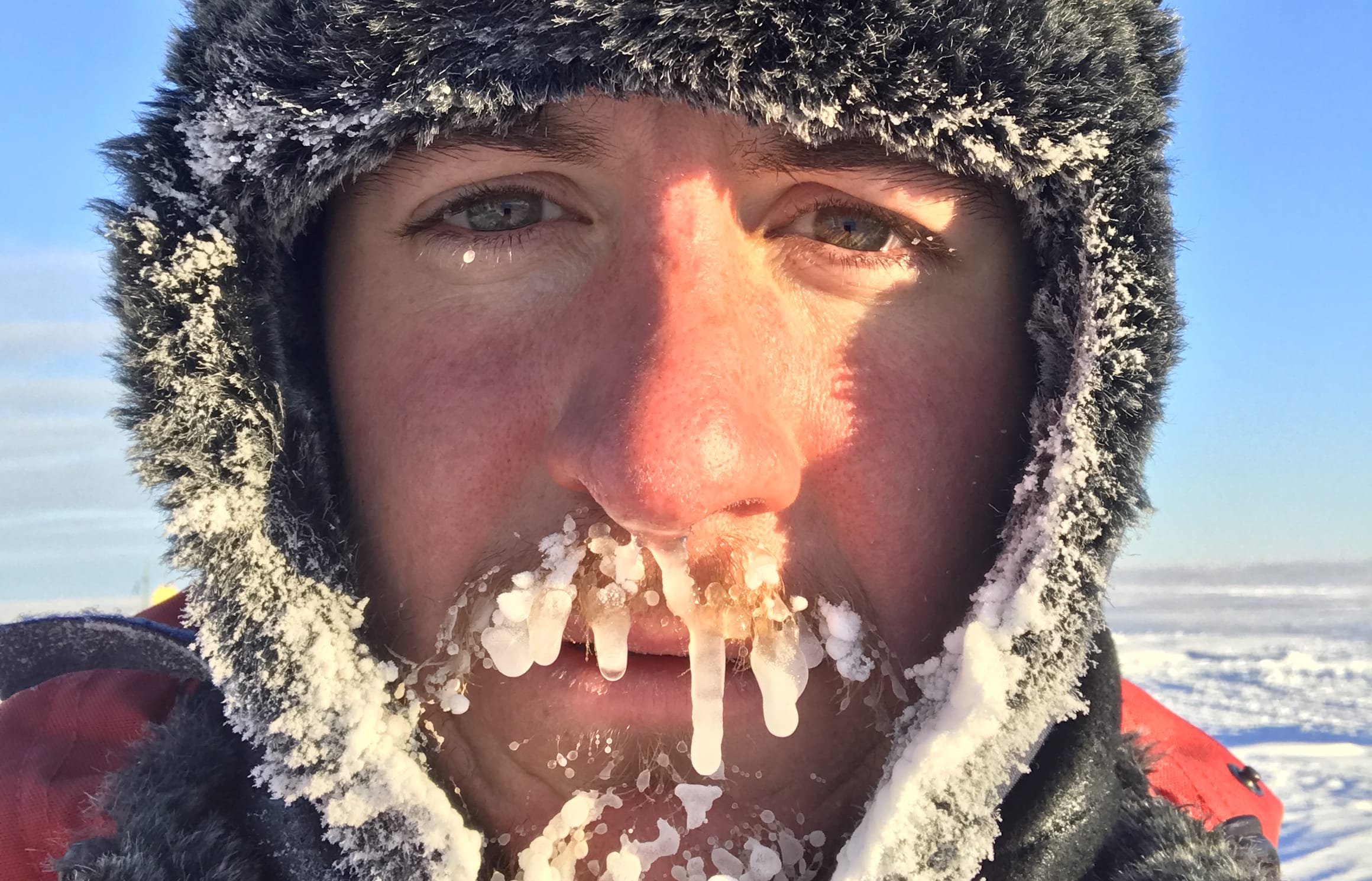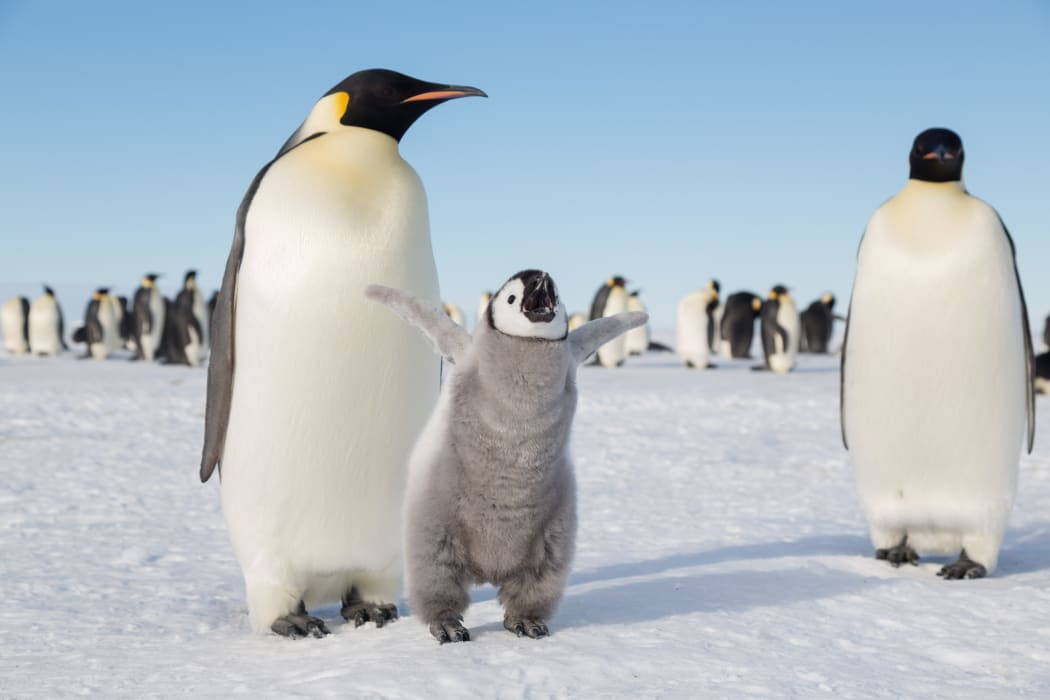Wildlife photographer Lindsay McCrae has travelled the globe from the jungle to the ice, recently spending a year in the company of emperor penguins in Antarctica for David Attenborough's BBC series Dynasties.
He won a BAFTA for his cold camerawork, but missed the birth of his first child in the process.

Photo: Supplied
McCrae tells Lynn Freeman tales of incredible survival (both his and the penguins') at -40 degrees C, now the subject of his first book My Penguin Year.
After news of the collapse of the second largest breeding colony, McCrae says he’s concerned for the future of the emperor penguin.
“I think the next few years are going to be critical to see how much the planet does warm and how much the ice melts.”
Before penguins entered his life, McCrae had a fondness for badgers which lived near his home in the north of England. He says he spent almost every evening sitting and watching the badgers who got used to his company.
He sent a letter to the BBC suggesting they set the Springwatch show there one year. They turned him down, but instead suggested making a film about McCrae and the badgers.
“Up to that point I’d had no interest in photographing or filming wildlife, but with [BBC] lending me a camera to film the badgers, that was start of it and I realised the possibilities I could create with this little piece of kit.”
Following that, he saved up and bought a video camera of his own. He left school at 18 ready to begin a career in filming wildlife.
“You sort of never expect it to happen, it’s one of those crazy jobs - the dream job - and nobody ever thinks they’re going to get the dream job.”
He was lucky enough to have a few contacts in the BBC through his badger project. He was offered a job making cups of tea for the Springwatch show.
“It was a foot in the door and I got to meet more people. That was the key step forward.”
Following that, he went freelance and began filming British wildlife, but was soon offered trips abroad to places such as Alaska and Canada where he filmed grizzly bears and wolves.
“It was the dream. Travelling the world and seeing such incredible wildlife. But that dream of Antarctica was still there, but you never expect it to happen.”
One day during his freelance career he received an email with the subject line “big BBC film trip” which changed his life.
“Obviously being freelance you never quite know what’s coming your way and usually it’s just an email. But this was strangely vague and it was from Miles Barton and I’d grown up knowing his name. Immediately I was intrigued and it was a phone call with him that led to the offer of going to Antarctica.”
It was no ordinary freelance project and the time period was much longer than his usual projects. That led to a difficult conversation with his partner.
“She knew it was my dream yet we were together, we had commitments. I didn’t want to leave her, but equally knew I couldn’t turn this opportunity down. She obviously didn’t want me to leave but knew I couldn’t turn it down.
“It was a tense couple of weeks, but I’m extremely lucky to have Becky, who’s now my wife, she fully understood and was on board and said we can work around this so let’s go for it.”
The series differs from a typical nature documentary because the emperor penguins, for the majority of time, are indistinguishable from one another. It’s even difficult to separate male from female. They decided, therefore, to follow the entire colony rather than an individual group or family of penguins.
“Especially during the winter, they rely on each other to survive, so it is one giant family if you like.”
In order to prepare for 8 months in Antarctica, the ground crew spent around 6 weeks on a glacier in Austria pulling each other out of crevasses and doing first aid and survival training. They couldn’t, however, prepare for the remoteness and isolation of Antarctica.

Emperor penguins and chick. Photo: Sue Flood
“That was a strange one. We arrived in the summer and there were about 60 people on Neumayer station where we were because the summer season is quite short - beginning of November to the end of February - so there’s lots of people there, it’s quite a busy place. Come the end of February, that last plane leaves and there was just twelve of us left.”
McCrae says there was a crew of three working on the film and a group of German specialists and scientists who stay at the station each winter.
“I was waiting for that day and just wondering up until that day I could’ve gone home. But once that last plane leaves you’re stuck. I was slightly nervous about that day, but when we reached it we were all very excited. We were being abandoned, if you like, at the bottom of the planet. It was more exciting than it was nerve wracking. But obviously, that was it and I knew there would be no getting home until the beginning of November.”
He said, thankfully, everyone got on well and have become a tight knight group of friends.
When autumn came and the sea ice had frozen over, McCrae and his colleagues got their first view of the penguins.
“Almost hovering above the ice these black specks appeared on the horizon and just never stopped. All of a sudden, there were thousands making their way towards us and it was as if they’d all decided to return at the same time.
“It was the sight that myself and my colleagues had dreamt of and, knowing that so few people had ever seen it, it felt very special.”
He says that despite most emperor penguins having never seen a human, they were inquisitive and friendly towards the crew.
“They’re fantastic and so beautiful when you see them that close up. They’re perfection in every respect, probably the cutest animals in nature.”
McCrae says that while the emperor penguin is majestic in the water, they’re clumsy on land. This makes their mating a bit a of spectacle.
“You can imagine, when the female has to drop down and the male climb on her back, my colleague described it as a penguin trying a surfboard out. A very quick affair, but they often ended up just falling off and rolling to one side, bless them.”
He says the females laid their eggs in May after the sun had set for the last time that season. The eggs are quickly passed to the males who incubate them. To keep warm, the fathers-to-be join together and form a huddle.
“They rely on each other, especially in those cold days. When they do huddle, there can be up to 10 birds per square metre.”
When Dynasties came out, one scene caused quite a controversy. The group had filmed penguins trapped on a ravine and decided to intervene and build stairs in the ice so they could reach the top. It was a decision not taken lightly.
“We’d been with the birds about ten months by that point, it was late September, and being with them ten months, they felt like family. We’d spent every minute of every day that we could with the birds, we’d become incredibly attached to them.”
He says they returned to the colony after the biggest storm they’d experienced in their time in Antarctica.
“We knew the birds would’ve taken a big hit during the storm, but obviously we’d not been able to get down to them.”
When the storm passed and on clear day and they went down to the colony, he says it was carnage.
“Unfortunately, dead chicks were everywhere. Adults were running around looking for their chicks, chicks had lost their parents and were running around looking for them. But also, there were these deep ravines in the ice that the wind had created and at the bottom of these ravines were groups of penguins and a lot of them still had young chicks on their feet.”
He says these penguins were in a lot of trouble because having chicks on their feet limited the use of their legs.
“We quickly saw a couple of birds sacrifice their chicks and be able to use their legs freely and climb out. For birds that didn’t have chicks, it was easy scaling these near vertical walls. But for them to get out, their chick was going to die and we simply couldn’t let that happen anymore.”
He says they had a day to talk about it but decided that because there were no other animals or predators on the land that could benefit from dead penguins in the ravine, they decided to help.
“We grabbed our shovels and all we could do was dig into this slope and create a shallower ramp on the side of the slope so they could shuffle up with their chicks on their feet.”
McCrae says what they did or didn’t do to help would’ve been controversial either way. But after the incident, they had the backing of the producers at BBC and Sir David Attenborough who said he’d have done the same.
Despite looking forward to seeing his family and friends, and meeting his new son, leaving Antarctica was a bittersweet moment for McCrae.
“It’s a fantastic place and it’s probably the most beautiful place on earth… Emperor penguins being the animal I’ve spent the longest time with in my life, I’ll probably never see another one. That was difficult coming to terms with."

